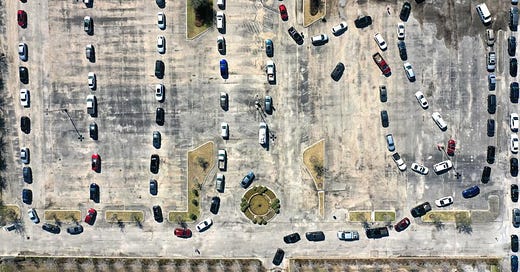Forbes Piece: In Texas, Senators Vote To Finally Fix The State’s Electric Grid
[Note: This piece was also published at Forbes.com]
HOUSTON, TEXAS - FEBRUARY 20: An aerial drone view of cars lining up for a water distribution event at the Fountain Life Center on February 20, 2021 in Houston, Texas. Much of Texas is still struggling with historic cold weather and power outages.
GETTY IMAGES
The Texas state senate voted overwhelmingly late Wednesday to finally fix a chronic issue known to plague the ERCOT-managed power grid for well over a decade now. On a bipartisan veto-proof vote of 22-9, members approved SB 6, which would create a fund to help finance the addition of up to 10 gigawatts of new dispatchable thermal generating capacity, most likely powered by natural gas.
The bill, along with SB 7 - also passed on Wednesday on a unanimous vote - is part of Lt. Governor Dan Patrick’s priority agenda for the 2023 session of the legislature. Patrick has described SB 6 as “an insurance policy for Texas,” one designed to fix a lingering issue known to exist on the Texas grid for the last 12 years.
Republican Sen. Charles Schwertner, who chairs the Senate Business and Finance Committee and is the lead sponsor on both bills, said SB 6 “guarantees steel in the ground and low interest loans for dispatchable generators,” and added in his motion to pass the bill that it was being done “in memory of the hundreds of Texans that died and the millions of Texans that suffered.” The latter is a reference to the more than 200 Texans who died and millions who went without electricity for days when the state’s grid suffered a massive failure during 2021’s Winter Storm Uri.
The grid’s known lack of reserve generation has been allowed to linger since 2011, when storm similar to Uri put most of the state into a deep freeze and caused rolling blackouts in February of that year. As they did in 2011 and 2021, organizations representing the state’s power generators wasted no time jumping in to oppose this latest attempt by policymakers to address the matter.
“It represents a costly tax on consumers that does not improve reliability,” said Michele Richmond, executive director of the Texas Competitive Power Advocates. “Unfortunately, it sends a clear message that Texas does not believe in the competitive market and will result in state-owned generation systemwide.”
This is inaccurate. First, the new capacity would not be “state-owned.” The program would actually ensure that adequate dispatchable thermal capacity that the members of TCPA have consciously chosen not to build despite a well-known, chronic need becomes a reality after a dozen years of inaction. The competitive market that helped create the deadly disaster of Winter Storm Uri will be free to go right along failing to ensure grid reliability.
Keep reading with a 7-day free trial
Subscribe to Energy Transition Absurdities to keep reading this post and get 7 days of free access to the full post archives.




